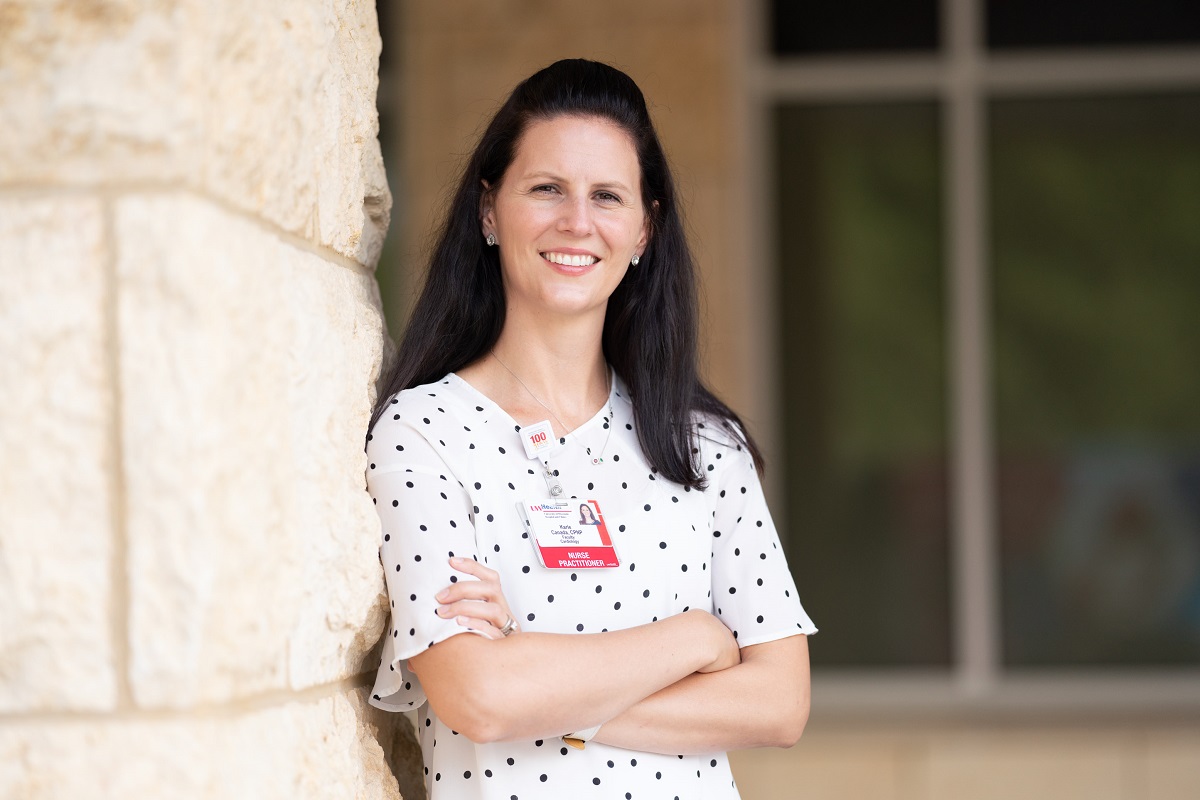
APP Champion: Karie Canada, NP, Pediatric Cardiovascular Medicine, American Family Children’s Hospital
If your child has open heart surgery at American Family Children’s Hospital (AFCH), they likely will be seen at some point by Karie Canada, pediatric cardiovascular nurse practitioner.
Karie works with pediatric patients born with heart abnormalities—congenital heart defects (CHD)—and those with acquired heart disease. One of the primary patient populations she works with is children with single ventricle heart disease and newborns who need surgery shortly after birth. CHD can lead to problems with any part of the heart, including the upper (atria) and lower (ventricles) heart chambers, the atrial and ventricular septae, the large and smaller blood vessels and the heart valves. Genetic conditions can also be associated with CHD.
“The patients in our single ventricle population typically require surgery shortly after birth, at 3–4 months, then again at 3–4 years. I assist with our successful interstage home monitoring program for these babies,” says Karie. “Many of our patients are born at UnityPoint Health – Meriter Hospital but can be referred to us from any hospital in the region. After surgery at American Family Children’s Hospital, our little patients are cared for in our pediatric intensive care unit (PICU) by a collaborative team. Our pediatric heart care team will continue to oversee these patients’ care as they grow and develop.”
UW Health Kids heart specialists provide experience and expertise in caring for the tiniest hearts. In fact, our team offers advanced heart surgery at American Family Children’s Hospital, which ranks among the nation’s best hospitals for pediatric cardiology and heart surgery.
UW Health is lucky to have Karie and her incredible dedication to her young patients. As a pediatric cardiovascular nurse practitioner, she provides comprehensive and seamless care for patients and families coping with cardiovascular conditions. Nurse practitioners enhance communication among team members, provide continuity of care and facilitate inpatient throughput. They also carry out therapeutic procedures as well as monitor, maintain and report on the progress of patients to the supervising physician. On the inpatient units, they initiate transfers and discharges, place orders, and evaluate new consultations with the entire pediatric heart specialist team.
Karie first worked at the University of Florida Health Shands Hospital in the PICU as a bedside nurse. She moved to Wisconsin in 2008 and worked in the PICU at American Family Children’s Hospital from 2008–2016. While working, Karie went back to school and earned her Master of Science degree in Nursing from the University of Alabama to become a primary care nurse practitioner. In July 2015, she accepted the position for an advanced practice provider (APP) in cardiovascular pediatric medicine.
“During my years as a bedside nurse, I had a passion for working with patients with cardiac disease. I often would care for post-surgical cardiac patients and loved learning the anatomy and physiology of cardiac disease. Although my job can be challenging at times—there is always something new to learn in cardiology—to watch our patients recover from surgery and go on to thrive in life is extremely rewarding.”
Karie enjoys the interstage home management part of her job, which is essentially the period between the first and second surgery for single ventricle patients or those with similar physiology. This is a crucial time as these patients can be very tenuous. It also puts added stress on the families due to the tasks and monitoring that must be done at home.
“During the interstage period, we monitor many things such as weight, oxygen saturations and feeds. I typically call the patient’s family about twice a week to check in. They can page me if they have any concerns or questions. Most of the patients graduate from interstage at about 3–4 months of age, but there are some unique circumstances where I follow kids for a few years,” Karie explains. “My favorite part is building relationships with the families and watching the children grow. It’s valuable time. My goal in the interstage program is not only to make sure the child is thriving but also offer resources, education and support for the family going through a stressful time in their life. I have several patients I keep in touch with even after I no longer see them in interstage. To see these children grow and thrive is the ultimate goal.”
Karie attributes patient success to the team approach in providing care. She works alongside pediatric cardiothoracic surgeons, cardiac anesthesiologists, cardiac intensive care nurse practitioners and intensivists, physician assistants, nurses, nutrition specialists, pharmacists, respiratory therapists, physical therapists, and occupational and speech therapists who are specially trained to care for newborns with heart defects.
“I am fortunate to work with such a collaborative team to provide the best care for our patients. The thing I value the most about this collaboration is we all bring different experiences, thought processes and values to provide comprehensive decision-making,” says Karie. “We do see a variety of complex congenital heart disease patients since we are a referral center for many health systems throughout Wisconsin, Illinois and South Dakota.”
Outside of work, Karie finds time to get involved in community education and volunteering. Her cardiology team is active in the American Heart Association Heart Walk in Madison each year. In fact, she was team captain for a few years prior to COVID-19 and organized fundraising and a face-painting stand at the event.
“Since the pandemic, we have been restricted on social events for the local CHD support group, which used to be held at AFCH. Support groups are a wonderful way to create community, offer support and nurture a healing environment for our families. I am hoping we will be able to resume them soon.”
